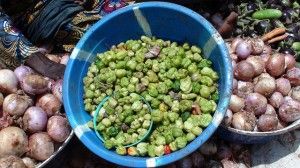
Publisher:
Bonnie King
CONTACT:
Newsroom@Salem-news.com
Advertising:
Adsales@Salem-news.com

~Truth~
~Justice~
~Peace~
TJP
Mar-23-2011 21:15

 TweetFollow @OregonNews
TweetFollow @OregonNews
A 'Revolution of Greens' Needed to Curb Food Price Crisis
Salem-News.comWorldwatch Institute's Nourishing the Planet team highlights need for innovations in indigenous vegetable production to improve food security and raise incomes in the long term
 Diversifying food production to include local and indigenous vegetables can help communities boost their self-sufficiency and protect vulnerable populations from price shocks. (Photo credit: Bernard Pollack) |
(WASHINGTON D.C.) - Food prices have soared to record highs and are projected to increase further in the coming decade, pushing millions of people into hunger and fueling political unrest around the world. The Worldwatch Institute's recently released report, State of the World 2011: Innovations that Nourish the Planet, shows that diversifying food production to include local and indigenous vegetables can help communities boost their self-sufficiency and protect vulnerable populations from price shocks.
"The solutions to the price crisis won't necessarily come from producing more food, but from listening to farmers, investing in indigenous vegetables, and changing how foods are processed and marketed," said Danielle Nierenberg, co-director of Worldwatch's Nourishing the Planet project (www.NourishingthePlanet.org)
Over a 15-month period, researchers with Nourishing the Planet traveled to 25 countries in sub-Saharan Africa highlighting stories of hope and success in agriculture. The project's on-the-ground research unearthed hundreds of environmentally sustainable solutions for reducing hunger and poverty. "The project aims to create a roadmap for the funding and donor community to ensure that agricultural funding is directed to projects that really work," said Brian Halweil, Nourishing the Planet co-director.
Mainstream agricultural approaches have tended to focus on a handful of staple crops, such as rice, wheat, and maize, and to promote the use of expensive, high-tech inputs, creating an unsustainable and vulnerable food system. Last year's drought in Russia that damaged a third of the country's wheat harvest, together with widespread flooding in Pakistan and Australia, caused price shocks around the world. Skyrocketing food prices are especially destabilizing in poor, import-dependent countries such as those in Africa, where households spend up to 80 percent of their income on food. In Egypt, the world's leading wheat importer, a 70 percent rise in wheat prices helped trigger the recent wave of protests that swept the country. Subsequent unrest across the region is raising fears about global instability.
Investing in agricultural development, especially indigenous vegetable crops, could help feed communities in Africa and worldwide, boosting their resilience to price shocks while helping farmers protect biodiversity and mitigate the impacts of climate change. "There is no other single sector of the global economy that is so central to meeting the needs of the nearly 7 billion people on the planet, while also protecting the health of the environment," said Worldwatch President Christopher Flavin.
Food security is not only about the quantity of food we eat, but also about the quality and diversity of food sources. In contrast to the staple grains that receive disproportionate attention from development aid, vegetables can offer a sustainable solution for a diverse and balanced diet. Growing vegetables can help address the "hidden hunger" of micronutrient deficiencies that affects some 1 billion people worldwide, and also brings multiple benefits for farmers."Vegetables have shorter cycles, are faster-growing than cereal crops, and require little space," says Abdou Tenkouano, director of AVRDC-The World Vegetable Center's Regional Center for Africa and State of the World 2011 contributing author.
The small-scale "revolution of greens" that is currently underway in Africa deserves greater attention from the global funding and donor communities. Researchers, nongovernmental organizations, and farmers across the continent are rediscovering traditional diets, improving the availability of nutritious indigenous vegetables (such as moringa and lablab), and reigniting interest in traditional vegetable dishes.
Nourishing the Planet's on-the-ground research offers three major policy recommendations to boost worldwide interest in and availability of indigenous vegetable varieties:
Listen to farmers. Organizations like AVRDC and the International Development Research Centre hold periodic workshops and field days, bringing together farmers, consumers, businesses, and communities to identify varieties of onion, tomato, eggplant, and okra that grow the best, taste the best, and perform best at local markets. This helps researchers develop more nutritious and locally adapted varieties that enhance and complement specific food preparations.
Get seeds to farmers. The seeds of preferred vegetable varieties are being made more widely available in Africa and elsewhere. Better seeds mean more vitamins in the food, better-tasting food, and ultimately less hunger and malnutrition. After scientists at AVRDC developed two higher-yielding tomato varieties with thicker skins-making them less vulnerable to pests and damage-farmers growing these varieties raised their incomes by 40 percent.
Take advantage of what's local. As the impacts of climate change become more evident, indigenous vegetables that have been neglected for decades are regaining attention because of their tolerance to drought and resistance to pests. Researchers have developed improved varieties of amaranth, African eggplant, African nightshade, and cowpea that are now widely available in many parts of Africa. In Uganda, Project DISC (Developing Innovations in School Cultivation), supported by Slow Food International, is reigniting an interest in these foods by teaching students how to grow and cook indigenous vegetables.
State of the World 2011: Innovations that Nourish the Planet is accompanied by informational materials including briefing documents, summaries, an innovations database, videos, and podcasts, all available at www.NourishingthePlanet.org. The project's findings are being disseminated to a wide range of agricultural stakeholders, including government ministries, agricultural policymakers, and farmer and community networks, as well as the increasingly influential nongovernmental environmental and development communities.
Articles for March 22, 2011 | Articles for March 23, 2011 | Articles for March 24, 2011
Salem-News.com:





Terms of Service | Privacy Policy
All comments and messages are approved by people and self promotional links or unacceptable comments are denied.
[Return to Top]
©2025 Salem-News.com. All opinions expressed in this article are those of the author and do not necessarily reflect those of Salem-News.com.